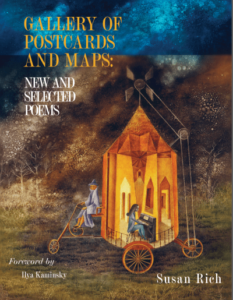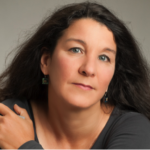
 Review by Jennifer Martelli
Review by Jennifer Martelli
The cover image of Susan Rich’s Gallery of Postcards and Maps: New and Selected Poems is Caravan by the surrealist painter, Remedios Varo. This bright and complex image shows a woman at a piano in a small caravan outfitted with intricate pulleys and wheels, set against a shadowy landscape. The book is dedicated to her contemporary and friend, Leonora Carrington, the surrealist artist and political activist. Rich’s work reflects this same masterful and surreal shape-shifting and travel, as well as a precise palping of the world’s political heartbeat. While the collection signals movement—the titles of Rich’s books all convey travel and re-invention—there is a constancy of intention, or as Ilya Kaminski states in his introduction, “the connective line between mere arrangement and daily life. . .impacting the world we live in.” The poems accumulate images of shape-shifting, travel, and politics to create an alchemical self-portraiture.
“I am one superhighway/of flesh and fingertips and kaleidoscopic vision,” Rich states in “Someday I Will Love Susan Rich.” The poet shape-shifts as a means of looking at the self. Within this vision, the speaker attempts to define where she is in the closing of the previous century and this one: where she belongs, or perhaps, what her “shape” is. In “The K Word—,” the speaker confronts anti-Semitism by looking at the etymology of the k-word while pondering the horrible stereotype of Jewish people having “little horns under their chaps.” Rich “felt my own skull for signs.” This questioning of Jewish identity is echoed in “A Poem for Mr. Raphael Siv at the Irish Jewish Museum,” when she asks, “And why not? Aren’t you Irish and Jewish? / a heritage any writer would covet, / hurriedly convert to . . . .”
Rich’s attention to detail—much like the Varo painting—grounds the reader as we look through her lens. In “Extreme Close-up,” the father’s mustache is “a tadpole” that “appears/then disappears,” and his “ears do resemble/oyster shells.” Like Varo, Rich’s poems seek the exact colors and images, which can be slippery. The speaker attempts, in “Dear Self,” to capture the exact hue and language:
The word I object to in the poem is blue
as in aquamarine, periwinkle, cornflower,
the shade of rain, of wind, of a girl’s bicycle
stolen from the beach last July. I object
to the semi-colon; the commonplace
comma, the em dash—as in Blue Danube—
//
yes, even the author
who praises acres of tulips, orgasms in France.
The travel in Rich’s poems includes world travel, as well as emotional travel. Through her global movement—Bosnia, Gaza, Somalia, The Republic of Niger, Ireland—Rich not only amasses images, but continues the re-forming of the self. In “Facing 50 with a Line by Robert Hayden,” she writes
What clings to us (train trips, questions)
fall forward to all
the future will randomly
reduce to an email, an hour,
a knot of pleasure nearly pursued.
Again, with an impeccable eye (and pen), Rich engages all the senses with her movement. The balance of sadness, longing, and pleasure is rendered in elegant couplets as Rich instructs us in “A Middle Life: A Romance” to
Let love be imminent and let it be a train;
let it arrive at dawn, its whistle whiskering the air—
all brightness and verb. Let it nearly race by
but not quite—this could be the rhythm of your life.
Don’t hesitate outside the dining car of eccentric
and dark-eyed strangers, conjuring their espresso—
ordering half the nerve. Let love be a breakfast
of crème cakes, pomegranate juice, a lively Spanish torte.
These “alchemist” nations that Rich takes us to are both personal and political ones, with a “new constitution, a policy, findings of Truth and Reconciliation.” The travel experience emphasizes being the “outsider” even in one’s own country, as an American child of outsiders, of people who have been “othered.” In the deeply historical poem, “Destruction,” Rich asks
What does it mean to be Jewish?
The gates of sadness never more
than a train stop away—
a six-pointed star I would slip off to gather perwinkles
on the beach—my ankles sea-stained and spectral.
Our family took the Bourne Bridge
to the Cape, the same one road as every local. . . .
The movement from zones fraught with war and history reflects a political shape-shifting. In “Interview,” the woman will need to “cross the boundary/navigate clear water, sleep again, be whole—she’ll erase her Muslim name, forget life’s memory.” Like so much of Rich’s poetry, even the most violent socio-political landscapes are rendered with precision. The insistence on triplets with exact or slant end rhymes creates shadow boxes of horror, filled with body and emotional trauma in “Whatever Happened to the Bodies. . .
I listen ready to participate – scrubbing souls from Tel Aviv’s streets.
Propel the senses to migrate beyond what I can think.
The prayers I’m meant to remember, the unutterable, the indistinct.
Whatever happened to the bodies without names?
Whatever became of people cannibalized, drowned, depraved?
Whatever moves us eventually moves away.
In “Dutch Courtyard,” the poet affirms her need to “palm the frame” as she “journeys in, traveling by window—worker, rich girl, artist in the street: go beyond the known.” Indeed, Rich’s poems are like framed works of art that demand close observation and reading. “Read slowly the small, good//stories—each image, otherworldly,” she writes in “Pomegranate, Radio On.” Rich embraces the vicissitudes of a single life and renders this shifting accessible, necessary, urgent. In the hands of a master artist like Susan Rich, “here the interior world opens/lightly as a letter.” Gallery of Postcards and Maps: New and Selected Poems is a collection I will journey to again and again.
Gallery of Postcards and Maps: New and Selected Poems by Susan Rich
Salmon Press
2022, 132 pages,
$16.00.
Jennifer Martelli is the author of The Queen of Queens (forthcoming, Bordighera Press) and My Tarantella (Bordighera Press), selected as a 2019 “Must Read” by the Massachusetts Center for the Book. She is also the author of the chapbooks In the Year of Ferraro and After Bird, winner of the Grey Book Press open reading, 2016. Her work has appeared in Poetry, The Academy of American Poets Poem-a-Day, The Tahoma Literary Review, Verse Daily, Thrush, and elsewhere. Jennifer Martelli has twice received grants from the Massachusetts Cultural Council for her poetry. She is co-poetry editor for Mom Egg Review.
